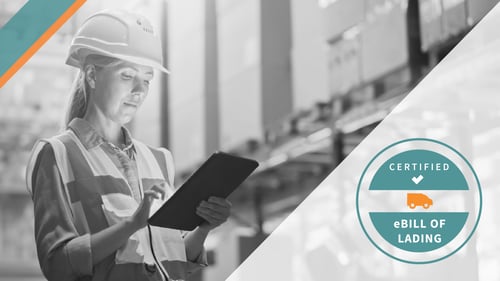- News -
MyCarrier Holds the Key to Efficiency and Sustainability Amid Supply Chain Disruptions

Today’s supply-chain disruptions are significant and widespread, causing many organizations to abandon their environmental goals and commitments. While most are prioritizing low costs over sustainability, MyCarrier, an automated Less-Than-Truckload (LTL) shipping management platform, can deliver both to shippers and carriers. MyCarrier's electronic bill of lading (eBOL) solution has proven to ease freight strains and drive unprecedented operational improvements, while reducing carbon emissions and paper waste.
The First Multi-carrier eBOL Solution
MyCarrier is the only shipping management platform today that works with multiple carriers to implement eBOL. Though some platforms offer the limited use of eBOL with one or two carriers, MyCarrier provides the ability to fully utilize this technology across 85% of its carrier partners.
While the LTL industry continues to handle the majority of all shipments with paper-based processes, MyCarrier successfully processed over 700,000 eBOL shipments in the first three quarters of 2021, up from 500,000 shipments in all of 2020. In fact, over 70% of shipments on the MyCarrier platform now utilize eBOL.
Tommy Barnes, transportation industry veteran and MyCarrier CRO, has seen the advantages of eBOL firsthand. Barnes commented that, “paper-based procedures in the shipping industry commonly lead to costly errors, reduced productivity, and unnecessary waste. These have been especially detrimental in the current tight capacity market. Fortunately, our eBOL helps carrier partners plan their network and optimize service levels like never before.”
IPC Global Solutions, a longtime MyCarrier customer, has fully transitioned from standard BOL to eBOL. Byron Howard, VP of Operations at IPC Global Solutions, noted the benefits that the MyCarrier eBOL offers. “EBOL allows us to electronically transmit all of our data directly to the LTL carriers, so they get earlier visibility, and we get better service,” Howard said. “This has allowed us to deliver our freight in-tact and on-time, which is not easy in the current tight capacity market. It not only makes our jobs easier and saves us money, but it eliminates paper waste. That, and contactless operations are just a no-brainer during the pandemic.”
Bryan Robert, owner of Indoor Comfort Supply, is another shipper who has fully adopted MyCarrier’s eBOL. “The way the system automatically creates an eBOL and sends it to my carrier and the customer at the same time, saves [the company] a lot of time and energy,” Robert noted. “This opens up visibility all across the board and helps us cut back on waste.”
Though eBOL has been lauded for cutting back on paper waste, the sustainability advantages delivered by MyCarrier’s solutions go even deeper. Old Dominion Freight Line (ODFL), a MyCarrier white label partner, experiences these benefits daily. Todd Polen, Vice President of Pricing at ODFL, said, “With eBOL we try to get the data at pickup, so we can improve route and linehaul planning. This may reduce stop times and may allow us to run less out of route miles. What’s fantastic about this, is that we’re not only saving money and increasing efficiencies, but we’re also using less fuel and potentially reducing emissions.”
Promoting Industry-Wide Advancements
MyCarrier is also a strategic member of the Digital LTL Council (DLC), which was established in 2019 to promote digitalization across the industry. With MyCarrier’s help, the council recently introduced the industry’s first official standards for eBOL. DLC estimates that digitalization will likely save organizations up to 2% of freight under management (FUM), saving the industry up to $1.2 billion annually.
Christian Piller, head of the DLC and Vice President of project44, is excited to see industry leaders working together to increase eBOL adoption. “MyCarrier is really championing this movement, helping the entire industry to understand that eBOL not only increases value-based visibility for shippers and carriers, but is a win for the environment too,” Piller said. “In fact, if only 700,000 eBOLs replace standard BOLs each day, we estimate that over 17,000 trees will be saved, removing almost 850,000 pounds of CO2 from the atmosphere each year. These numbers, combined with the network savings and efficiency, are a stark reminder of why eBOL is so essential.”
SCHEDULE A 15-MINUTE DEMO OF MYCARRIER WITH ONE OF OUR LTL EXPERTS
We will show you just how easy and fast it is to dispatch a shipment through MyCarrier. From quoting to delivery, our experts will explain the jam-packed features and benefits that will make your day-to-day easier than shifting into first gear.